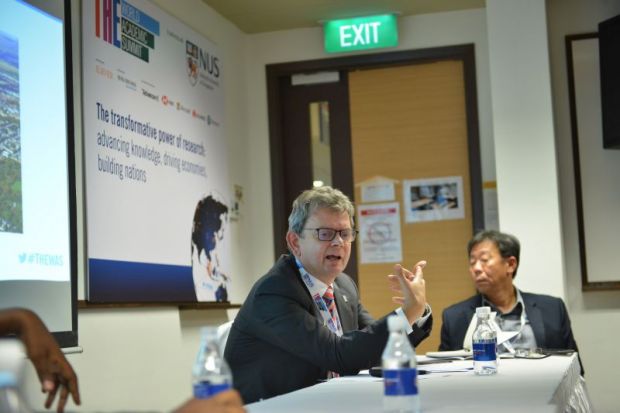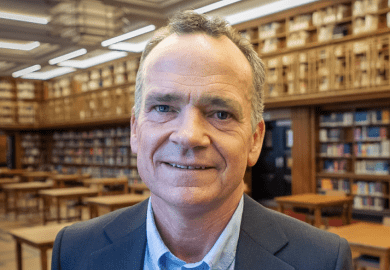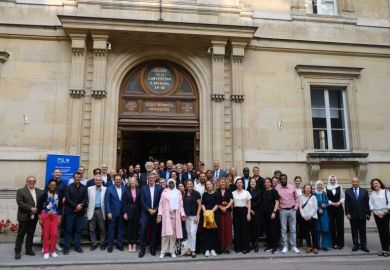If it wasn’t for one conversation with his father, Anton Muscatelli would probably be working in private finance today. Coming from a family of Italian subsistence farmers, the sharp Muscatelli senior regretted missing out on a life of academia, so encouraged his son to reject a graduate job offer in favour of a one-year university teaching contract.
The sliding-doors moment was the first step in Sir Anton Muscatelli’s sharp rise to principal and vice-chancellor at the University of Glasgow, and one of the UK’s foremost economists. He has advised the Westminster and Holyrood governments on economic policy and was knighted in the 2017 Queen’s Birthday Honours for services to economics and higher education.
Muscatelli spoke to THE in his small office on the grand, gothic university campus. Dressed casually, and with a soft Glaswegian accent, he has an air of quiet authority and an ability to explain complex economic ideas in layman’s terms.
If the leading economist were given free rein to design the financial set-up of higher education and research from scratch, he would prefer a direct funding model, with no or very low tuition fees. “One of the problems with the system that we’ve developed in the UK compared to the rest of continental Europe is that it’s brought the whole system to focus too much on the private benefits of higher education and not the public benefits,” he says.
“We’ve tended to create a kind of consumerist model, which I think probably helped universities in England in the short run [with funding via tuition fees]. I don't think it helped the long-run debate for the value of higher education.”
OECD data make it clear, he says, that the public benefits outweigh the private due to gains made from additional skills, productivity and tax in the public coffers.
This would not prevent higher education funding becoming a political football, he acknowledges. “Then you need to depoliticise the whole issue of how much resource goes into the system,” he says.
What does he think, then, of the argument certain MPs adhere to that courses that produce low earners should be scrapped? He gives a succinct economist’s answer: “The state is there to essentially provide a level of skills and a level of training that will allow the economy as a whole to benefit. That then gets repaid through the tax system and the tax system, if it’s progressive, will inevitably be calibrated to earnings. So why do we need to think about trying to create a market mechanism around earnings?”
The approach also discounts those low earners who provide a high benefit to society, such as many health workers. “If I choose to leave university with a highly skilled degree but then choose a low-paid profession because it adds a huge amount to society, when I derive very little personal [financial] benefit, why should that be a bad thing? That’s a good thing. And it’s a choice.”
Reparation
Under Muscatelli’s leadership, the University of Glasgow has led the sector when it comes to addressing links to slavery and attempting reparative justice.
While the death of George Floyd in 2020 and the Black Lives Matter movement were the impetus for much action in the sector, Glasgow had published a report into the university’s financial gain from slavery-related wealth and a plan for justice two years earlier, in 2018. Their efforts won them Times Higher Education’s University of the Year award in 2020.
That report led to a unique partnership with the University of the West Indies, which involved setting up the Glasgow-Caribbean Centre for Development Research (GCCDR) to stimulate public awareness about the history of slavery and its impact around the world.
This is “really important because it talks to historical debt”, says Muscatelli, but “it’s not about creating equity around a particular historical episode. It’s about more generally. We’re now in the 21st century; humanity is facing some terrible challenges, including climate change, and many other challenges deriving from that. And I think I would like to see our initiative around reparative justice as being an element of that wider canvas in which we work with partners in low- and middle-income countries to create more equitable partnerships.”
When asked if other universities are doing enough, Muscatelli responds diplomatically. “I think we as a sector need to do more.” Two years after George Floyd’s death galvanised many into action, is the impetus waning? “I‘d like to think the impetus is still there,” he says. “I don’t think this thing should be about particular political issues that are of the day, some of these things around global justice, transcend or should transcend the current fashion or political debates.”
“I think there are some real issues that we need to deal with,” he says, citing the Equality and Human Rights Commission report on racism in UK universities published in 2019. “I don’t think the momentum will die down, because I think the echoes of slavery are still with us today through racism, through other sorts of discrimination of ethnic minorities.”
The GCCDR is one element of Glasgow’s wider social-impact programme, which includes a commitment to the United Nations’ Sustainable Development Goals. Spending money on such projects means less spent elsewhere, but Muscatelli says he hasn’t had any pushback from staff or students. “I haven't had a single colleague or a single student come to me and say: ‘Why are you spending money on this particular initiative when you could be doing that?’”
Muscatelli’s commitment to social justice partly stems from his roots in a family of immigrants. His father, having missed out on university, worked in shipping and moved the young family to the Netherlands, then back to Italy before finally settling in Glasgow. Before that, one grandfather was an immigrant to the US.
Dropping out
Muscatelli was the first in his family to attend university but failed at his first attempt when he dropped out of Imperial College London a few weeks into a physics degree. (“There you go, I’m a dropout,” he says.) Economics had captured his interest and he returned to Glasgow for a second attempt at a degree. Other than brief sabbaticals and sojourns elsewhere, he hasn’t left, becoming a professor at 30 years old and vice-chancellor at Heriot-Watt University in Edinburgh at 45, before moving back to Glasgow as v-c in 2009.
These days he has less time for research but does use his economic knowledge to advise governments: “I do get a lot of pleasure out of trying to use my economics to try and solve problems.” He sat on Nicola Sturgeon’s Council of Economic Advisers for seven years and sees himself as something of a civil servant. That is why he will not reveal which way he voted in Scotland’s 2014 independence referendum, not even to his wife. “You wouldn't ask a senior civil servant: ‘Who did you vote for in the general election?’” he says.
He did not apply this rule to Brexit, however, and in 2016 warned against the economic damage that leaving the EU would bring in no uncertain terms, describing it as “the UK’s most unhinged example of national self-sabotage in living memory”. In this case, “the interests of the university were touched”, he says, and the Senate, the university’s academic body, decided to take a public stance.
Today, he believes his warnings over Brexit are being realised. While the pandemic added to the economic turmoil, we may be starting to see the effect of lower volumes of trade, reduced productivity and lower skilled migration caused by Brexit, he says. “I'm actually of the view that we haven't seen the full economic damage. No, I think we're only beginning to see the tip of the iceberg.”
Muscatelli is on his third five-year term at Glasgow and plans to step down in 2024 or 2025. He may yet have more of the Brexit fallout to grapple with, as he hopes to spend more time advising on government policy.
This is part of our “Talking leadership” series with the people running the world’s top universities about how they solve common strategic issues and implement change. Follow the series here.
Register to continue
Why register?
- Registration is free and only takes a moment
- Once registered, you can read 3 articles a month
- Sign up for our newsletter
Subscribe
Or subscribe for unlimited access to:
- Unlimited access to news, views, insights & reviews
- Digital editions
- Digital access to THE’s university and college rankings analysis
Already registered or a current subscriber?










